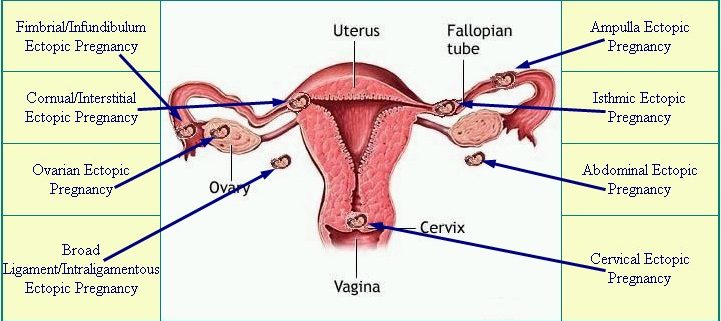Ectopic Pregnancy
An ectopic pregnancy occurs when the fertilized egg attaches itself to a place other than inside the uterus. Almost all ectopic pregnancies occur in the fallopian tube and are thus sometimes called tubal pregnancies. The fallopian tubes are not designed to hold a growing embryo; thus, the fertilized egg in a tubal pregnancy cannot develop properly. An ectopic pregnancy is rare but serious, and they need to be treated, it happens in 1 out of 50 pregnancies.
Ectopic pregnancies can also happen on your ovary, or somewhere else in your belly.
Ectopic pregnancy is very dangerous if not treated. Fallopian tubes can break if stretched too much by the growing pregnancy — this is sometimes called a ruptured ectopic pregnancy. This can cause internal bleeding, infection, and in some cases lead to death.
What causes an Ectopic Pregnancy?
Ectopic pregnancies are caused by one or more of the following:
- An infection or inflammation of the fallopian tube can cause it to become partially or entirely blocked.
- Scar tissue from a previous infection or a surgical procedure on the tube may also impede the egg’s movement.
- Previous surgery in the pelvic area or on the tubes can cause adhesions.
- Abnormal growths or a birth defect can result in an abnormality in the tube’s shape.
Who is at risk for having an ectopic pregnancy?
We don’t always know the cause of ectopic pregnancy. But you may be more likely to have an ectopic pregnancy if you:
- have had an STD, pelvic inflammatory disease or endometriosis
- previous ectopic pregnancy
- previous pelvic or abdominal surgery
- are 35 or older
- smoke cigarettes
- Several induced abortions
If you get pregnant after you’ve been sterilized or while you have an IUD (Intrauterine Device), it’s more likely to be ectopic. But this is very rare because these types of birth control are super effective at preventing pregnancy.
What are the symptoms of an ectopic pregnancy?
Although you may experience typical signs and symptoms of pregnancy, the following symptoms may be used to help recognize a potential ectopic pregnancy:
Sharp or stabbing pain that may come and go and vary in intensity. (The pain may be in the pelvis, abdomen, or even the shoulder and neck due to blood from a ruptured ectopic pregnancy gathering up under the diaphragm).
- Vaginal bleeding, heavier or lighter than your normal period
- Gastrointestinal symptoms
- Weakness, dizziness, or fainting
- Shoulder pain
If you have severe pain or bleeding, go to the emergency room right away. If you have any other symptoms of ectopic pregnancy, contact your doctor or nurse as soon as you can. The earlier an ectopic pregnancy is found and treated, the safer you’ll be.
How Is An Ectopic Pregnancy Diagnosed?
Ectopic pregnancies are diagnosed by your physician, who will probably first perform a pelvic exam to locate pain, tenderness, or a mass in the abdomen. Your physician will also use an ultrasound to determine whether the uterus contains a developing fetus. The measurement of hCG levels is also important. An hCG level that is lower than expected is one reason to suspect an ectopic pregnancy.
Your doctor may also test your progesterone levels because low levels could be a sign of an ectopic pregnancy. In addition, your physician may do a culdocentesis, which is a procedure that involves inserting a needle into space at the very top of the vagina, behind the uterus and in front of the rectum. The presence of blood in this area may indicate bleeding from a ruptured fallopian tube.
What’s the treatment for an ectopic pregnancy?
Ectopic pregnancy treatment is medicine or surgery:
- You get shots of a medicine called methotrexate that ends the ectopic pregnancy. It stops the fertilized egg’s cells from growing, and your body absorbs any cells that have already developed. This shouldn’t damage the fallopian tubes at all.
- The pregnancy is removed with a surgical procedure using laparoscopy. Your doctor makes a small cut near your belly button and removes the pregnancy using surgical tools and a tiny camera to see inside your body. This is the most common treatment for ectopic pregnancy. Sometimes, this procedure causes scarring in your fallopian tube, or a piece of the fallopian tube needs to be removed.
- If the tube has become stretched or has ruptured and started bleeding, part or all of it may have to be removed. In this case, bleeding needs to be stopped promptly, and emergency surgery is necessary.
Can I get pregnant again after an ectopic pregnancy?
The chances of having a successful pregnancy after an ectopic pregnancy may be reduced, but this will depend on why the pregnancy was ectopic and your medical history., depending on the treatment you had and the condition of your fallopian tubes. If the fallopian tubes have been left in place, you have approximately a 60% chance of having a successful pregnancy in the future.
If one of your fallopian tubes was removed or your tubes are scarred, it may be more difficult to get pregnant. If you have an ectopic pregnancy, you’re more likely to get another one in the future.
The information, including but not limited to, text, graphics, images and other material contained on this website are for informational purposes only. The purpose of this website is to promote broad consumer understanding and knowledge of various health topics. It is not intended to be a substitute for professional medical advice, diagnosis or treatment. Always seek the advice of your physician or another qualified healthcare provider with any questions you may have regarding a medical condition or treatment and before undertaking a new health care regimen, and never disregard professional medical advice or delay in seeking it because of something you have read on this website.




Leave a Reply
Want to join the discussion?Feel free to contribute!